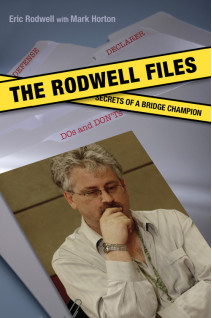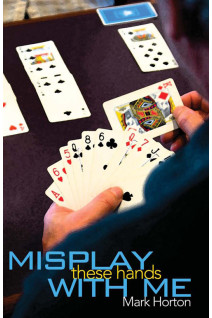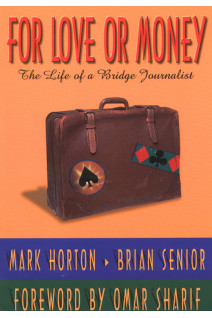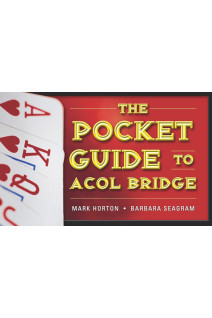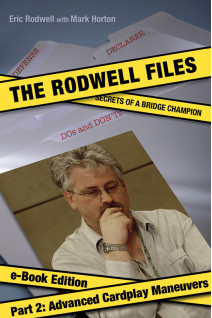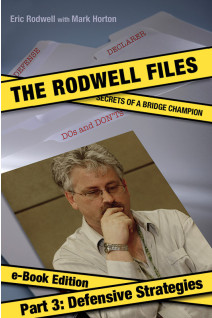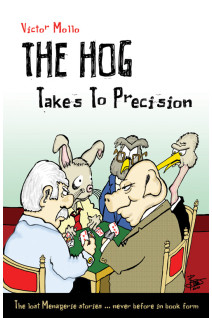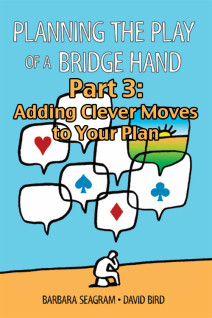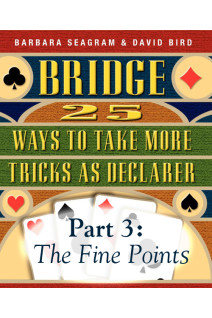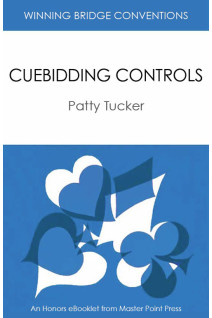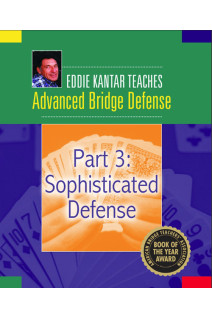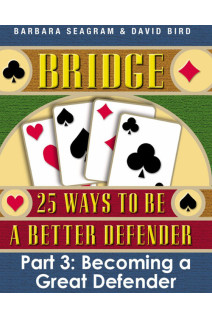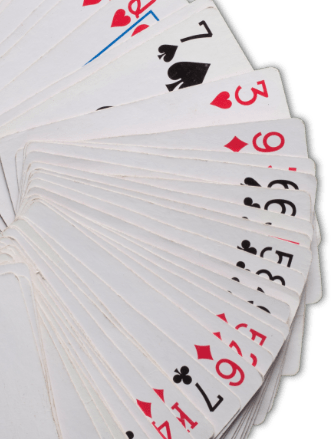The Rodwell Files, Part 4 of 4: The DOs and DON'Ts of Cardplay
- Adobe .PDF
- .epub format (most e-Readers)
- .mobi format (for Kindle)
The Rodwell Files, Part 4 of 4: The DOs and DON'Ts of Cardplay includes
Chapter 16: The DOs of Cardplay 1. Count HCP's, Shape, Winners and Losers2. Reconstruct Both Unseen Hands
3. Pay Attention to Negative Inferences from Earlier Plays and/or Bidding4. Check Your Work for Errors — Do It Twice5. Anticipate Possible Snags6. Check Out a Minor Option Before Taking the Main Line7. Look for the Possibility of a Dummy Reversal
8. Use the Defogging Questions when Your Analysis Gets Bogged Down9. Make Sure You Are Aware when the Play Follows a Tightrope
10. Keep Up with the Facts as They Become Available and Restock Regularly11. Make Sure You Register Information as it Becomes Available12. Be Alert to the Need for a Change of Tack13. Trust the Opponents' Carding
14. Notice and Take Correct Inferences from Surprising Actions by an Opponent
15. Look for Ways to Create a False Impression in the Mind of an Opponent16. Prepare Your Falsecards17. Lead Toward High Cards to Prevent Them Being Ruffed Out
18. Cash Your Tricks Before the Opponent(s) Can Discard in a Suit and Subsequently Ruff Your Winners19. Routinely Unblock Spotcards
20. Be Alert for Situations Where One of the Opponents Can Be Cut Off21. Be Alert for Unusual Types of Holdup Play22. Be Alert for (Perhaps Unusual) Ducking Plays23. Try to Neutralize the Opponents' Winners24. Always Consider Partner's Problems on Defense25. View the Play from the 'Danger Hand' Perspective
26. Try to Figure Out Why an Opponent Is Playing a Hand in a Certain Way27. Be Prepared for a Play
28. Watch for Situations where Communication Problems Exist, or Could be Made to Exist29. Always Consider the Merits of Passive Play
30. Be Prepared to Make an Attacking Shift if the Situation Demands It
Chapter 17: The DON'Ts of Cardplay 1. Don't Take Speculation as Fact
2. Don't Mire Your Thought Processes in Speculation Once Facts Are Available
3. Don't Make a Play in a Crucial Suit Before All Possible Information Is Obtained4. Don't Strip Out Your Side's Suit as a Defender5. Don't Forget to Use Trick Packages in Your Analysis6. Don't Lose Your Train of Thought7. Don't Succumb to Emotional Prejudice8. Don't Get Locked into a Pattern9. Don't Get Caught in a 'Thematic Freeze'10. Don't Concede to Analytical Fatigue
For the remaining volumes, look for the following titles:
The Rodwell Files, Part 1 of 4: The Building Blocks
The Rodwell Files, Part 2 of 4: Advanced Cardplay Maneuvers
The Rodwell Files, Part 3 of 4: Defensive Strategies
About the Book: Eric Rodwell's contributions to bidding theory are well-known, but in these ground-breaking books he reveals for the first time his unique approach to the play of the cards.
First, he describes and explains the process for deciding on a line of play — using concepts such as +L positions, tightropes, trick packages and Control Units as well as exploring more standard themes such as counting winners, losers, and distribution. Included here too is a checklist of 'defogging questions' to get you back on track when your analysis gets bogged down. Then he moves on to a host of innovative ideas in cardplay, strategies and tactics that can be used by declarer or defenders, each one illustrated with real-life examples from top-level play. Many of these ideas will be new to anyone below the bridge stratosphere. Finally, under the heading 'DOs and DON'Ts', Rodwell talks about the mental side of the game: areas where players often go wrong in their approach to the problem at hand, areas that mark the key differences between an average player and a successful one.
The original 'Rodwell File', the collection of notes on which these books are based, has been in existence for more than twenty years, but it is only now that the author is prepared to allow his 'secrets' to become public knowledge.
For the complete book see the following title:
The Rodwell Files: Secrets of a bridge champion
- Language: English
- Categories:
The Rodwell Files, Part 4 of 4: The DOs and DON'Ts of Cardplay includes
Chapter 16: The DOs of Cardplay 1. Count HCP's, Shape, Winners and Losers2. Reconstruct Both Unseen Hands
3. Pay Attention to Negative Inferences from Earlier Plays and/or Bidding4. Check Your Work for Errors — Do It Twice5. Anticipate Possible Snags6. Check Out a Minor Option Before Taking the Main Line7. Look for the Possibility of a Dummy Reversal
8. Use the Defogging Questions when Your Analysis Gets Bogged Down9. Make Sure You Are Aware when the Play Follows a Tightrope
10. Keep Up with the Facts as They Become Available and Restock Regularly11. Make Sure You Register Information as it Becomes Available12. Be Alert to the Need for a Change of Tack13. Trust the Opponents' Carding
14. Notice and Take Correct Inferences from Surprising Actions by an Opponent
15. Look for Ways to Create a False Impression in the Mind of an Opponent16. Prepare Your Falsecards17. Lead Toward High Cards to Prevent Them Being Ruffed Out
18. Cash Your Tricks Before the Opponent(s) Can Discard in a Suit and Subsequently Ruff Your Winners19. Routinely Unblock Spotcards
20. Be Alert for Situations Where One of the Opponents Can Be Cut Off21. Be Alert for Unusual Types of Holdup Play22. Be Alert for (Perhaps Unusual) Ducking Plays23. Try to Neutralize the Opponents' Winners24. Always Consider Partner's Problems on Defense25. View the Play from the 'Danger Hand' Perspective
26. Try to Figure Out Why an Opponent Is Playing a Hand in a Certain Way27. Be Prepared for a Play
28. Watch for Situations where Communication Problems Exist, or Could be Made to Exist29. Always Consider the Merits of Passive Play
30. Be Prepared to Make an Attacking Shift if the Situation Demands It
Chapter 17: The DON'Ts of Cardplay 1. Don't Take Speculation as Fact
2. Don't Mire Your Thought Processes in Speculation Once Facts Are Available
3. Don't Make a Play in a Crucial Suit Before All Possible Information Is Obtained4. Don't Strip Out Your Side's Suit as a Defender5. Don't Forget to Use Trick Packages in Your Analysis6. Don't Lose Your Train of Thought7. Don't Succumb to Emotional Prejudice8. Don't Get Locked into a Pattern9. Don't Get Caught in a 'Thematic Freeze'10. Don't Concede to Analytical Fatigue
For the remaining volumes, look for the following titles:
The Rodwell Files, Part 1 of 4: The Building Blocks
The Rodwell Files, Part 2 of 4: Advanced Cardplay Maneuvers
The Rodwell Files, Part 3 of 4: Defensive Strategies
About the Book: Eric Rodwell's contributions to bidding theory are well-known, but in these ground-breaking books he reveals for the first time his unique approach to the play of the cards.
First, he describes and explains the process for deciding on a line of play — using concepts such as +L positions, tightropes, trick packages and Control Units as well as exploring more standard themes such as counting winners, losers, and distribution. Included here too is a checklist of 'defogging questions' to get you back on track when your analysis gets bogged down. Then he moves on to a host of innovative ideas in cardplay, strategies and tactics that can be used by declarer or defenders, each one illustrated with real-life examples from top-level play. Many of these ideas will be new to anyone below the bridge stratosphere. Finally, under the heading 'DOs and DON'Ts', Rodwell talks about the mental side of the game: areas where players often go wrong in their approach to the problem at hand, areas that mark the key differences between an average player and a successful one.
The original 'Rodwell File', the collection of notes on which these books are based, has been in existence for more than twenty years, but it is only now that the author is prepared to allow his 'secrets' to become public knowledge.
For the complete book see the following title:
The Rodwell Files: Secrets of a bridge champion
There are no reviews for this product yet
Be the first to write a review

 Swipe left
Swipe left


